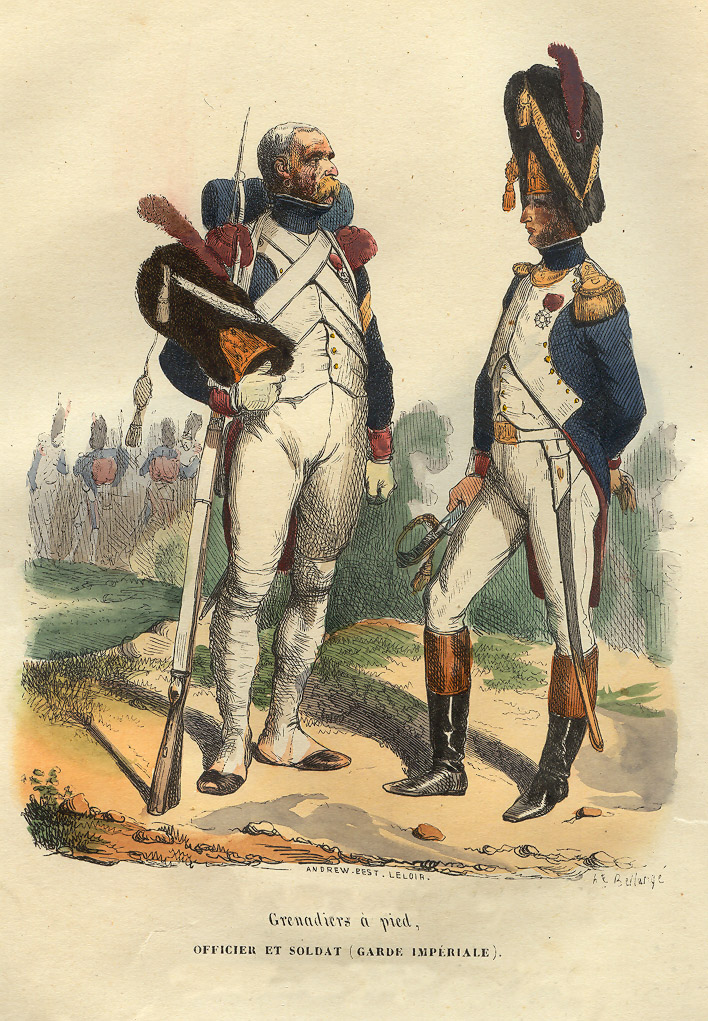The author of these letters, François Franconin (1788-1857), was sergeant-major in the 1st Regiment of the Grenadiers of the Guard.
Nogent-sur-Seine, 22 February 1814.
I make use of the opportunity of an officer lodged in the same building as myself, who is heading for Paris with dispatches, to inform you that my health is as good as you could wish for and that I have returned safe and sound from various affairs which took place in the vicinity of Montmirail and Château-Thierry and where the (Imperial) Guard basically bore the brunt of the fighting. We were not sent into battle at Nangis and Montereau.
Prior to all these successes, the enemy believed themselves to be the masters of France and could, for a few more days, indeed have been. Now, at our approach, they withdraw with the greatest haste. Rumour has it that the remnants of the coalition army are attempting to join the still intact army commanded by the Prince of Schwarzenberg; it is said that, in two or three days, a battle is to be fought which will determine the fate of France and mark it forever.
If we are fortunate, and I have no doubt we will be, I will write to you at once in order to reduce as soon as possible the dreadful apprehension which will obviously weigh on your sensitive heart.
I embrace you …
I await the result of this new campaign to thank as fully as I can our dear relative and his kind wife for the interest they have never ceased to take in my fate.
Farewell …
P.S. – Always address my letters to the general headquarters.
***
Fontainebleau, 2 April 1814.
It has been at least three months since I received any news from you, although I have written to you several times. Please let me know as soon as possible whether you have received any letters from me since your last one, so that I can only blame the damned Cossacks for my ignorance of your fate.
You must be familiar with the progress of the enemy since their entry into France; we have been fatigued a great deal since that time, without ever being able to reach them, except for a few cases with all their combined forces. We were hoping at last to find them under the walls of Paris and determine the fate of the Empire, if the cowardice of the Parisians had not rendered our efforts and the incredible activity of the greatest of men meaningless.
Paris had at least one hundred and forty thousand men armed and equipped as soldiers, including eighty thousand men of the National Guard, perfectly well organized and trained for a long time. This Parisian army, by manoeuvring only and staying out of gun range, could have prevented the enemy from approaching the barricades and entering Paris; but these cowards, unworthy of the French name, have cruelly deceived the hope of the sovereign and the army; they had mustered a small body of troops, formed of all the united depots of the Guard, to resist for an entire day all the efforts of the enemy, whose army was brought up to nearly 160,000 men. They were crushed whilst they were confined to their homes, and awaited the Allied troops with a certain amount of joy.
The army, which was marching at great speed, could not delay in reaching the capital. If these feeble Parisians had held out during this time, Paris would have been saved with the whole of France, and the enemy would have been disconcerted and beaten completely. That one does not speak to me any more about the National Guard to defend a city or to wage war; (they are) men accustomed to the comforts of an idle life and only occupied with their appearance and pleasing women, loving their existence too much to contribute to the salvation of the fatherland.
How the French have degenerated! One would think one was in the centre of a foreign nation, if one did not still find a few courageous individuals who were receptive to the setbacks of this same fatherland that was once so cherished. There is no more enthusiasm; that is to say there is no more heart, there is no more love for her. The entire nation is almost indifferent to the unfortunate events which have just overwhelmed it and which affect its glory.
Very remote from the capital, when the Emperor learned that it was threatened, the army was heading towards it swiftly when the terrible news, that the enemy had entered it almost without finding any resistance, struck us like a thunderbolt, however without dashing our courage and eliminating the hope of victory. The Emperor told us today to be patient; that, in two days at least, we would go and reproach the Parisians for their lack of patriotism and would drink good wine (soon).
We have been at Fontainebleau since yesterday. Everything is being prepared to recapture Paris. The troops are arriving en masse.
Therefore write to me, my dear father, to get rid of the mortal dread that some misfortune has befallen you, and that you and the whole family are in as good health as I desire.
My address is still the same company. However, instead of sergeant-major, you might want to write second lieutenant. I have been an officer since 15 March. This news cannot but delight you, as well as the general who I am about to write.
Many compliments to you.
Franconin’s Peninsular War correspondence features in my book ‘Devils, Daggers & Death’.
Source : ‘Lettres et souvenirs du commandant François Franconin’, in Le Carnet de la Sabretache, Berger-Levrault & Cie, 1910, pp. 17-19.

Leave a comment